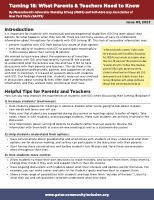Guardianship Alternatives and Transfer-of-Rights (GATOR) explores the relationship between special educators' transfer-of-rights and guardianship discussions and key predictors of transition outcomes for students with intellectual and developmental disabilities (IDD).
GATOR is dedicated to informing education professionals, families and supporters of youth with IDD about transfer-of-rights.
What does GATOR do?
Throughout this 4-year project, we will:
- Conduct a scoping literature review about guardianship, transfer-of-rights, and transition planning
- Compose a 50-state analysis of special education transfer-of-rights laws
- Interview national experts on guardianship and supported decision making in the context of transition planning
- Interview students with IDD, their parents, and teachers about transfer-of-rights and guardianship in Massachusetts and New York
- Develop a theoretical framework for understanding how transfer-of-rights processes conducted during transition planning may affect post-school outcomes for students with IDD
GATOR is a 4-year project funded in 2019 by the Institute of Education Sciences at the US Department of Education. The Institute for Community Inclusion at the University of Massachusetts Boston is partnering with the Self Advocacy Association of New York State (SANYS) and Massachusetts Advocates Standing Strong (MASS), in consultation with the Harvard Law School Project on Disability (HPOD) to implement this project.
Overview
This project tracks and analyzes transfer-of-rights rules across all 50 U.S. States, the District of Columbia, and Puerto Rico. This resource has been built by the Institute for Community Inclusion (ICI) at UMass Boston with information collected by researchers working at the Harvard Law School Project on Disability.
Please note that this information is subject to change. ICI does not guarantee the accuracy of this information. This resource is intended to be used for general reference and does not constitute legal advice. If you wish to alert ICI about an inaccuracy or misstatement, please contact Daria Domin.
Information is displayed in multiple formats. It can be viewed by selecting a State from the dropdown menu in the State-Specific Transfer-of-Rights Rules section. For a quick overview, users can click on a State on the map. Review these Frequently Asked Questions for answers to some general questions about the transfer of parental rights to students and guardianship alternatives. A glossary of terms will explain commonly used terms relating to the transfer-of-rights.
State-Specific Transfer-of-Rights Rules
Here you can learn more about your State's transfer-of-rights rules, including statutes, regulations, policies, and case law.
Click on a State in the map to see an overview of transfer-of-rights rules. Select the "See Map Data in Table View" button below the map to view transfer-of-rights rules (same data as the map displays) in a sortable table format.
Select a State from the dropdown to view information about that State.
Publications and Resources
What Is Known About Schools’ Transfer of Rights Practices for Students With Intellectual and Developmental Disabilities
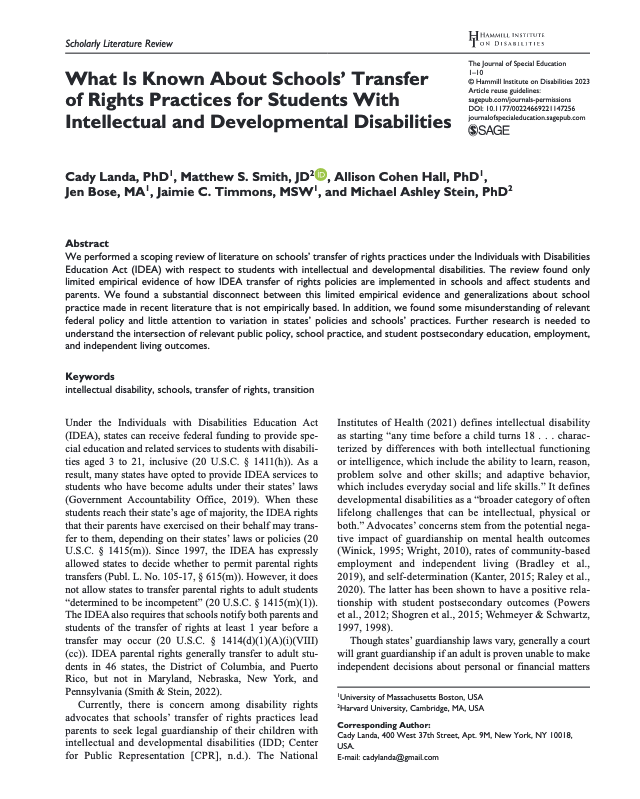
This article examines schools’ transfer of rights practices under the Individuals with Disabilities Education Act (IDEA) with respect to students with IDD.
Transfer of Parental Rights: The Impact of Section 615(M) of the Individuals with Disabilities Education Act
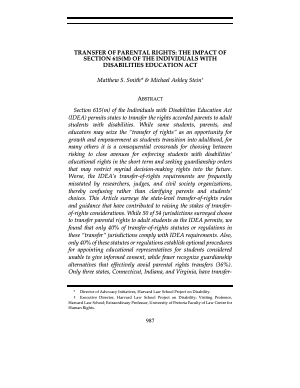
50-State Analysis of Transfer-of-Rights Rules and Policies. This in-depth article surveys all the transfer-of-rights rules and policies across the United States.
Resource List on Transfer of Idea Rights For Students with Disabilities

Resources related to the transfer of IDEA rights for students with disabilities: empirical research, law & policy analysis, self-advocacy materials, and professional, parent & general resources.
Understanding Transfer of Rights Discussions to Foster Meaningful Systems Change

TASH Conference Presentation, December 1, 2021
Brief Issue #2, 2021
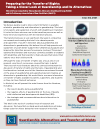
Preparing for the transfer-of-rights: Taking a Closer Look at Guardianship and its Alternatives.
Brief Issue #1, 2021

Transfer-of-rights: How Parents, Families, and Caregivers of Youth with IDD Can Prepare for this Exciting Opportunity
Resource List, 2021
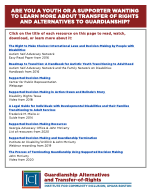
This publication is a resource list for youth and supporters wanting to learn more about transfer-of-rights and alternatives to guardianship.
Lessons Learned from Research Related to Transition-Age Youth

Reinventing Quality Conference Video, August 2021
Participatory Action Research on the Transfer of Parental Rights under IDEA

Council for Exceptional Children Learning Event, March 2021
FAQ about transfer-of-rights
Since 1997, Section 615(m) of the federal Individuals with Disabilities Education Act (IDEA) (20 U.S.C. § 1415(m)) and its regulations have allowed States to choose to transfer parents' rights under the IDEA to students when the students become adults or if they are incarcerated. With some exceptions, students generally become adults when they turn 18 years old. In all States that transfer parents' IDEA rights to adult students, parents' rights do not transfer to adult students who have legal guardians. There are also various kinds of alternatives to guardianship that prevent parental rights from transferring.
Do all U.S. States transfer parental rights to adult students?
Most (but not all) states choose to transfer parents' rights under the IDEA to adult students. These States are required to notify both parents and students at least one year before students become adults under State law. Many States also specifically choose to transfer parents' rights to students if they are incarcerated. In the four States where rights do not transfer, the parents retain full decision-making authority under the IDEA regardless of the students' age.
What role does FERPA play in transfer-of-rights?
Note that rights regarding access to student records recognized separately under the Federal Educational Rights and Protection Act (FERPA) transfer to students at the age of 18 regardless of whether that State chooses to transfer IDEA rights and regardless of the age of adulthood in that State.
What is the parental role in decision-making after IDEA parental rights transfer to students?
Even if important parental rights under the IDEA do transfer to adult students, the IDEA requires that parents always retain a right to notice. However, not all States' laws or regulations clearly recognize this requirement. Moreover, if parental rights transfer, then in most States parents lose the right to initiate due process or to file a lawsuit in their own name. Instead, adult students become responsible for asserting their rights under the IDEA in their own name. Even so, adult students to whom rights have transferred can choose to allow their parents to continue to participate in educational decision-making.
Do parental rights transfer to students who are deemed “incompetent”?
The IDEA does not permit States to transfer parents' rights to adult students who have been “adjudicated incompetent.” This generally refers to students who have legal guardians or conservators, although not all court orders appointing a guardian or conservator may include an “incompetency” determination. Some States' laws, for example, allow courts to appoint partial or limited guardians or conservators without specifically finding that adult students are “incompetent.”
What alternatives to guardianship avoid parental rights transfers?
Some States have specific laws or regulations recognizing alternatives to guardianship that avoid the transfer-of-rights to adult students. These include powers of attorney and delegations or assignments of rights. These alternatives to guardianship transfer parental rights from adult students back to the parents. Alternatives also include supported or shared decision-making arrangements, which afford parents post-transfer opportunities to participate in educational decision-making. Even where States' laws or regulations regarding transfer of IDEA rights do not specifically mention alternatives, powers of attorney should be sufficient in most States to avoid transfer-of-rights, although local education agency representatives in States without specific laws or regulations may be less familiar with this alternative.
Of 48 transfer States, 15 have laws or regulations clearly mentioning alternatives.
What else might prevent transfer-of-rights from happening?
Some States have specific laws or regulations creating a “special procedure” that prevents the transfer-of-rights. These “special procedures” generally entail a determination by the local education agency that the adult student, to whom rights would otherwise transfer, is unable to give the informed consent required of parents by the IDEA for educational decisions. These procedures generally allow the State or local education agency to appoint an educational representative to give the informed consent required by the IDEA on the adult student's behalf. Often, the educational representative is the adult student's parent.
How many States transfer parental rights to students when they become adults pursuant to Section 615(m)(1) of the IDEA (20 U.S.C. § 1415(m)(1))?
Of the 50 States, the District of Columbia and Puerto Rico, 48 transfer rights (93%). Most States' special education laws or regulations clearly state that parental rights transfer to students when they become adults, while the transfer-of-rights policies of a few States appears only in State educational agency guidance.
How many States have adopted special procedures to appoint representatives for adult students unable to provide informed consent pursuant to Section 615(m)(2) of the IDEA (20 U.S.C. § 1415(m)(2))?
Of 48 transfer States, 12 have clear procedures or provisions. Another 5 States mention procedures but those have not been found.
How many States have codified alternatives to guardianship that avoid parental rights transfers?
Only 15 of the 48 transfer jurisdictions clearly mention alternatives in their laws or regulations. They include: powers of attorney, delegation or assignment of rights forms, supported decision-making, and shared decision-making.
How many States' agencies' guidance accurately notifies parents and students of their transfer-of-rights options?
Many, if not most, State educational agencies' guidance fails to accurately describe their transfer-of-rights rules. Importantly, many State educational agencies fail to notify parents and students of their right to avoid rights transfer by executing powers of attorney for educational decisions, despite the Department of Education's interpretation of Section 615(m) (https://www.federalregister.gov/d/06-6656/p-3322).
Glossary terms
- Age of majority
- refers to the age when children become adults in the eyes of the law in a given State. Note that the age of majority varies from State to State and also that the specific age of majority for educational decision-making that triggers transfer-of-rights may differ from the general age of majority that determines, for example, when someone may vote.
- Alternative to guardianship
- refers to an array of arrangements voluntarily entered into by two or more individuals where one person gives one or more others varying types of authority to make decisions on the first person's behalf. Alternatives to guardianship encompass both formal, written arrangements recognized by State laws as well as informal decision-making arrangements, agreements, and practices. Alternatives are often “less restrictive” than guardianship because they generally are voluntary in nature, do not involve court proceedings, and result in more narrowly tailored and individualized arrangements.
- Assignment/delegation of rights
- refers to an arrangement where an adult student voluntarily authorizes another person to make educational decisions on their behalf, in the same way the student's parent would have done so while the student was a minor. Not all State laws recognize assignment or delegation of rights, and the rules of those that do so vary. Assignment or delegation of rights is an example of an alternative to guardianship.
- Guardianship
- refers to a legal arrangement where one person (the “guardian”) is appointed by a court to make decisions on behalf of another person. Often, but not always, courts will appoint guardians for adults who they believe are unable to make certain or all kinds of decisions on their own. States' laws regarding guardianship vary. Certain States use other terms, such as “conservatorship,” in addition to or instead of “guardianship.”
- IDEA (pronounced I-D-E-A, not “idea”)
- is an acronym for the Individuals with Disabilities Education Act, which is a federal law enacted in 1990 that guarantees eligible students with disabilities a right to receive a free appropriate public education (FAPE). The IDEA permits States to transfer parental rights to students when they reach a State's age of majority, so long as they have not been “determined incompetent” under State law.
- Incompetent
- refers to a determination, generally by a court of law, that an individual lacks the capacity to make certain decisions on his or her own. Often, but not always, courts will determine that individuals are “incompetent” in the course of appointing guardians. The IDEA does not allow States to transfer parental rights to students who have been determined incompetent.
- FAPE
- FAPE is an acronym for “free appropriate public education”, which refers to the special education and related services that eligible students with disabilities are entitled to receive under the IDEA. Schools must develop an “individualized education program” or “IEP” for students entitled to FAPE. Read the legal definition of FAPE.
- FERPA
- is an acronym for the Family Educational Rights and Privacy Act, which is a federal law enacted in 1974 that protects the privacy of student education records. Note that parental rights under FERPA transfer to students when they turn 18 regardless of which State they live in.
- Power of attorney
- refers to a legal arrangement made between two adults where one (the “principal”) voluntarily authorizes another (the “agent” or the “attorney-in-fact”) to make certain legal, financial, medical, or other decisions on their behalf. States' laws regarding powers of attorney vary. A power of attorney is an example of an alternative to guardianship.
- Shared decision-making
- refers to a legal arrangement where an adult student receiving special education services authorizes one or more others to participate in the student's educational decision-making processes. Currently, only the Commonwealth of Massachusetts formally recognizes this arrangement. Shared decision-making is an example of an alternative to guardianship.
- Supported decision-making
- refers to an arrangement between two or more persons where one person agrees to receive varying kinds of assistance to make decisions from one or more supporters. Supported decision-making can refer to an informal practice or approach to helping certain persons make decisions, or a formal written agreement describing the kinds of assistance one person wishes to receive from one or more supporters. Not all State laws formally recognize supported decision-making arrangements, and the rules of those that do so vary. Supported decision-making is an example of an alternative to guardianship.
- Transfer-of-rights
- is a phrase that has a specific connotation in educational contexts. Transfer-of-rights refers to the process where many, but not all, educational rights afforded parents under the Individuals with Disabilities Education Act (IDEA) shift to students when students become adults, if the students receive special education services in a State that has adopted transfer-of-rights rules.

![Center Youth Voice Youth Choice [Logo]](/img/centeronyouthvoice_ICI_F.png)
